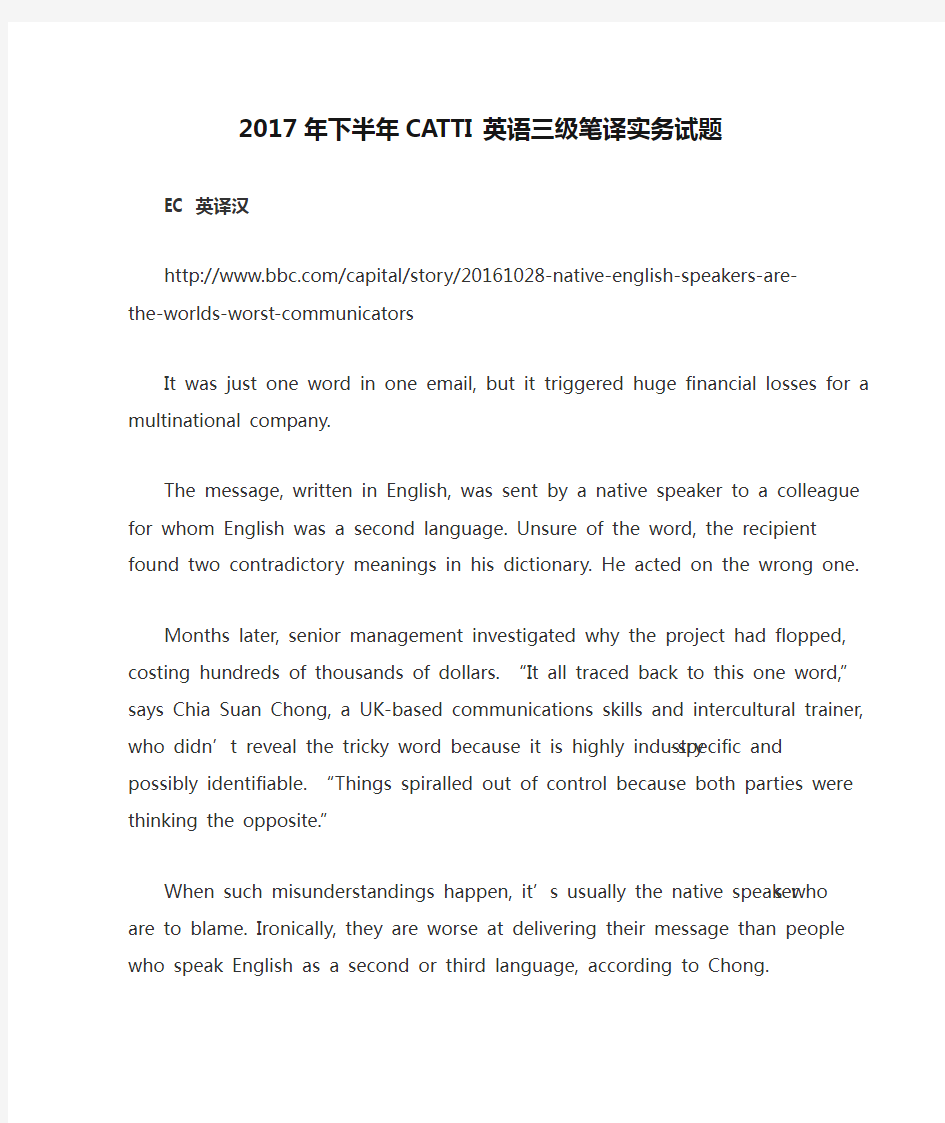2017年下半年CATTI英语三级笔译实务试题

- 1、下载文档前请自行甄别文档内容的完整性,平台不提供额外的编辑、内容补充、找答案等附加服务。
- 2、"仅部分预览"的文档,不可在线预览部分如存在完整性等问题,可反馈申请退款(可完整预览的文档不适用该条件!)。
- 3、如文档侵犯您的权益,请联系客服反馈,我们会尽快为您处理(人工客服工作时间:9:00-18:30)。
2017年下半年CATTI英语三级笔译实务试题
EC 英译汉
/capital/story/20161028-native-english-spea kers-are-the-worlds-worst-communicators
It was just one word in one email, but it triggered huge financial losses for a multinational company.
The message, written in English, was sent by a native speaker to a colleague for whom English was a second language. Unsure of the word, the recipient found two contradictory meanings in his dictionary. He acted on the wrong one.
Months later, senior management investigated why the project had flopped, costing hundreds of thousands of dollars. “It all traced back to this one word,” says Chia Suan Chong, a UK-based communications skills and intercultural trainer, who didn‟t reveal the tricky word because it is highly industry-specific and possibly identifiable. “Things spiralled out of control because both parties were thinking the opposite.”
When such misunderstandings happen, it‟s usually the native speakers who are to blame. Ironically, they are worse at delivering
their message than people who speak English as a second or third language, according to Chong.
A lot of native speakers are happy that English has become the world‟s global language. They feel they don‟t have to spend time learning another language,” says Chong.
The non-native speakers, it turns out, speak more purposefully and carefully, typical of someone speaking a second or third language. Anglophones, on the other hand, often talk too fast for others to follow, and use jokes, slang and references specific to their own culture, says Chong.
“The native English speaker… is the only one who might not feel the need to accommodate or adapt to the others,” she adds.
With non-native English speakers in th e majority worldwide, it‟s Anglophones who may need to up their game.
“Native speakers are at a disadvantage when you are in a lingua franca situation,” where English is being used as a common denominator, says Jennifer Jenkins, professor of global Englishes at the UK‟s University of Southampton. “It‟s the native English
speakers that are having difficulty understanding and making themselves understood.”
Non-native speakers generally use more limited vocabulary and simpler expressions, without flowery language or slang. And then there‟s cultural style, Blattner says. When a Brit reacts to a proposal by saying, “That‟s interesting” a fellow Brit might recognise this as understatement for, “That‟s rubbish.” But other nationalities would take the word “interesting” on face value, he says.
“English speakers with no other language often have a lack of awareness of how to speak English internationally.”
In Berlin, Coulter saw German staff of a Fortune 500 company being briefed from their Californian HQ via video link. Despite being competent in English, the Germans gleaned only the gist of what their American project leader said. So among themselves they came up with an agreed version, which might or might not have been what was intended by the California staff.
“To o many non-Anglophones, especially the Asians and the French, are too concerned about not …losing face‟ — and nod approvingly while not getting the message at all,” he says.
